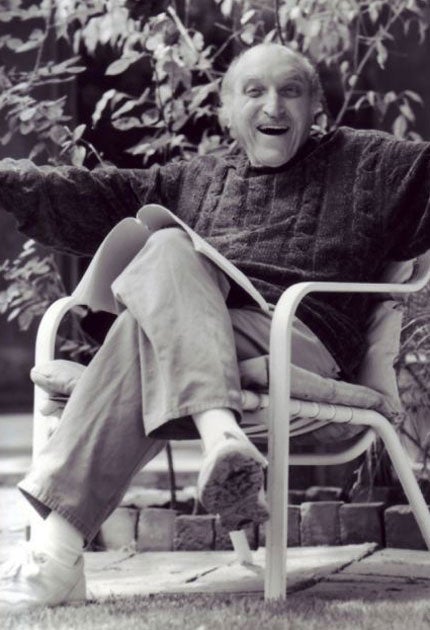Len Lesser: Character actor who found late-flowering fame as Uncle Leo in ‘Seinfeld’

Your support helps us to tell the story
From reproductive rights to climate change to Big Tech, The Independent is on the ground when the story is developing. Whether it's investigating the financials of Elon Musk's pro-Trump PAC or producing our latest documentary, 'The A Word', which shines a light on the American women fighting for reproductive rights, we know how important it is to parse out the facts from the messaging.
At such a critical moment in US history, we need reporters on the ground. Your donation allows us to keep sending journalists to speak to both sides of the story.
The Independent is trusted by Americans across the entire political spectrum. And unlike many other quality news outlets, we choose not to lock Americans out of our reporting and analysis with paywalls. We believe quality journalism should be available to everyone, paid for by those who can afford it.
Your support makes all the difference.For six decades, virtually from the birth of American television, Len Lesser toiled as a jobbing actor, his height, sharp features and strong Bronx accent always making his presence felt, even in small roles. He plied his trade for some 41 years before, finally, in his late sixties, his talent in a small comedy role on the hit show Seinfeld propelled him to a modicum of well-deserved fame.
Lesser played Jerry Seinfeld's Uncle Leo, whose loud "Jerry! Hello!", and insistence his nephew respond in kind, expressed his enthusiasm for family while highlighting the natural, old-fashioned New York Jewish gaucheness which was the polar opposite of Jerry's detached, self-absorbed urban cool. When Seinfeld ended after a nine-year run (1989-98), Lesser took the character almost intact to Everybody Loves Raymond, complete with a new catchphrase, "Hey, Ray's here!"
Had he been born in Italy, Lesser might have made a living playing villains in spaghetti westerns, his exaggerated features in extreme close-up in Sergio Leone's films. Indeed, Clint Eastwood used him exactly that way in a small part in The Outlaw Josey Wales (1976), after the two had worked together on the Second World War comedy Kelly's Heroes (1970), arguably Lesser's best film role.
Leonard King Lesser was born in December 1922 in the Bronx, where his father, a Polish immigrant, ran a grocery. A tall, geeky bookworm, he finished high school at 15 but found confidence in local youth theatre while attending City College of New York, from which he graduated at 19 with a degree in government and economics. He enlisted the day after the attacks on Pearl Harbor, and served in Burma and India.
After the war, he studied acting in New York on the GI Bill, at the American Theatre Wing, and worked as an extra at the New York City Center Opera. He made his television debut in 1949 in the live drama series Studio One, in "The Sharp Knife", based on a Dashiell Hammett story. The show also marked the debut of another tall and distinctive New York character actor, Abe Vigoda.
His resumé for the next four decades reads like a history of network television. He married Janice Burrell in 1954 and moved to Los Angeles, landing bit parts in films like Somebody Up There Likes Me and Lust for Life (both 1956), but by 1959 he was working regularly in dozens of television westerns, detective shows, and comedies, once playing the same character for both Jack Benny and Ernie Kovacs. He went uncredited in the Doris Day film Please Don't Eat the Daisies (1960) and Burt Lancaster's Birdman of Alcatraz (1962) before working on lesser projects like How to Stuff a Wild Bikini and McHale's Navy Joins the Air Force (both 1965). After Kelly's Heroes he had a small western role in Dirty Little Billy (1972) and played a guard in Papillon (1973). His later films saw him often used for comic effect in B-movies like Truck Stop Women (1974) and in 1990, with the prescient name of Uncle Ray, in Sorority Girls and The Creature from Hell.
Through all this time he worked on stage. His final appearance on screen was in 2009, in the TV series Castle, but by then he was already suffering from cancer. However, in 2010, he had two memorable roles on stage, being well-reviewed in Ronald Ribman's Cold Storage at the George Ignatieff Theatre in Toronto, and in Clifford Odets' Awake and Sing! with the Los Angeles company A Noise Within.
He told an interviewer in Toronto how Seinfeld changed his life. "Uncle Leo became a whole new thing for me," he said. "After sweating out every job, my God. Now it's everywhere I go. I was at the Wailing Wall in Jerusalem, watching people put notes in the wall, it's an esoteric day, very silent, very nice. All of a sudden: 'Uncle Leo, where's the watch?'"
Leonard King Lesser, actor: born New York 3 December 1922; married 1954 Janice Burrell (divorced 1984; one son, one daughter); died Burbank, California 16 February 2011.
Join our commenting forum
Join thought-provoking conversations, follow other Independent readers and see their replies
Comments